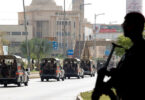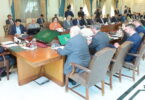KABUL (AFP): The US negotiator on Afghanistan said that president Ashraf Ghani’s abrupt exit scuttled a deal in which the Taliban would hold off entering Kabul and negotiate a political transition.
In his first interview since the collapse of the 20-year Western-backed government, Zalmay Khalilzad, who brokered a 2020 deal with the Taliban to withdraw US troops, told the Financial Times that the insurgents had agreed to stay outside the capital for two weeks and shape a future government.
“Even at the end, we had an agreement with the Talibs for (them) not to enter Kabul,” he told the newspaper in the interview published Wednesday.
But Ghani fled on August 15 and the Taliban, in a previously arranged meeting that day with General Frank McKenzie, chief of Central Command, asked if US troops would ensure security for Kabul as government authority crumbled.
“And then you know what happened, we weren’t going to take responsibility,” Khalilzad said.
President Joe Biden had insisted that US troops would only work to evacuate Americans and Afghan allies and not extend America’s longest war.
Asked about Khalilzad’s remarks, State Department spokesman Ned Price said it was not an option to stay “a moment longer” in Kabul.
“There was never a realistic, there was never a viable, there was never a practical option for the United States to stay,” Price told reporters.
“We were left with a very clear and stark impression that if the United States sought to prolong our presence on the ground, our servicemembers… would again be targets of Taliban violence not to mention terrorist attacks by groups like ISIS.”
Ghani, who sought safety in the United Arab Emirates, has apologized for how the government ended but said he left on the advice of palace security to avoid bloody street fighting.
The Taliban had been demanding the resignation of Ghani as part of any transitional government. Ultimately, the Islamists named a caretaker government with no non-Taliban nor women and that includes US-designated terrorists.
Secretary of State Antony Blinken, testifying before Congress this week, also said he spoke to Ghani on August 14 and that the Afghan leader agreed both to work on a transitional government and, if the Taliban reneged, to “fight to the death.”
Blinken said Ghani gave no warning he would leave the next day.
The Afghan-born Khalilzad, a senior figure in former president George W. Bush’s administration who was tapped by Donald Trump to negotiate the withdrawal, has come under fierce criticism in Washington after the Taliban takeover.
Khalilzad, who said he was surprised Biden kept him, did not take responsibility for how the war ended, saying it had been up to Afghans to reach a peace deal.
Taliban seize millions from ex-officials
Afghanistan’s central bank said Wednesday that the Taliban had seized more than $12 million in cash and gold from the homes of former government officials, as a financial crunch threatens the Islamists’ rule one month after they took back power.
Most government employees have yet to return to work — and in many cases salaries had already not been paid for months — leaving millions scrambling to make ends meet.
Even those with money in the bank are struggling, as branches limit withdrawals to the equivalent of $200 a week — with customers having to queue for hours.
And while remittances have resumed from abroad, customers awaiting funds at international chains such as Western Union and MoneyGram complained Wednesday that branches they visited had run out of cash.
The bank has called on all transactions in the aid-dependent country to be made in local currency.
“All Afghans in the government and non-governmental organisations are asked to use Afghani in their contracts and economic transactions,” the central bank said.
The bank later issued another statement saying Taliban fighters handed over $12.3 million in cash and gold seized from the homes of officials from the former government — a large part of which was discovered at the home of former vice president Amrullah Saleh.
“The money recovered came from high-ranking officials… and a number of national security agencies who kept cash and gold in their homes,” the bank said.
“It is, however, still not known for what purpose they were kept.”
– Thanking donors –
Abdul Rahim, a demobbed soldier in the former Afghan army, travelled nearly 1,000 kilometres (600 miles) from Faryab to the capital to try and collect his backpay.
“The branches of the banks are closed in the provinces,” he told AFP Wednesday, “and in Kabul, thousands of people queue to get their money out.”
“I have been going to the bank for the past three days, but in vain.”
The Taliban on Tuesday thanked the world after a donor conference in Geneva pledged $1.2 billion in aid for Afghanistan, but the country’s needs are immediate.
Donor nations, however, want conditions attached to their contributions and are loath to support a regime with as bloody a reputation as the Taliban.
The hardline Islamists have promised a milder form of rule compared to their first stint in power, from 1996 to 2001, but have moved swiftly to crush dissent — including firing in the air to disperse recent protests by women calling for the right to work.
Still, UN chief Antonio Guterres said this week he believed aid could be used as leverage with the Islamist hardliners to exact improvements on human rights.
“It is very important to engage with the Taliban at the present moment,” he said.
On Wednesday, players from the Afghan national girls’ football team arrived in Pakistan with their coaches and families, fearing a crackdown on sports.
Meanwhile, Iran became the latest country to resume commercial flights to Afghanistan, days after Pakistan relaunched a service between Islamabad and Kabul.
The United States said on Wednesday another US citizen and two US permanent residents had left Afghanistan by land the day before.
At least 36 citizens and 24 permanent residents have left the country with US government assistance since the military withdrawal at the end of August, State Department spokesman Ned Price said.
“That will very much continue,” he told reporters.
– Job satisfaction –
One month into their second rule, some Afghans are conceding there have been some improvements in their lives since the Taliban’s takeover — not least security in the capital, which for years was plagued by deadly suicide bomb attacks and targeted assassinations blamed largely on the Islamist group.
Laalagha, a street vendor, said he was no longer being shaken down by corrupt police officers — although he had switched to selling fruit as no one could afford to buy his previous ware of flowers.
“I am really satisfied with my new job. In the past the situation was like this… a policeman would come and puncture the stall’s tyre and he would beat you.
“Now no one is disturbing or creating problems.”
But at least half the population face the possibility of unemployment as the Taliban grapple with how to deal with women in the workforce.
“The Taliban have told us to stay home,” said one woman who worked in the telecoms ministry of the old government.
“There is security, but if there is no food soon the situation will change.”
The Taliban named an interim government last week and acting ministers have been holding press conferences spelling out policies that range from how women should dress at university to what sports can be played.
But the Taliban have been light on the details of how the country will be run and when they will get the civil service functioning again.






